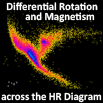Speaker
Scott G. Gregory
(School of Physics & Astronomy University of St Andrews)
Description
A number of maps of the surface magnetic fields of newborn Sun-like stars have now
been obtained using the technique of Zeeman-Doppler imaging. Their magnetic fields
can be significantly more complex than a simple dipole, the usual assumption of
models, and can vary markedly between sources. I will summarize the magnetic field
topology information obtained to date and present Hertzsprung-Russell diagrams for
the stars in the sample. Intriguingly, the large scale field topology of a given
newborn star, and in particular the strength of the dipole component of its
multipolar magnetic field (that which is most important in controlling how the star
interacts with its disk), is strongly dependent upon the stellar internal structure.
Using the observational data as a basis, I will argue that the general
characteristics of the global magnetic field of a newborn, still contracting pre-main
sequence, star can be determined from its position in the Hertzsprung-Russell
diagram, across which there are four distinct magnetic topology regimes. If the
empirical magnetic topology trends are confirmed with additional data, and can be
understood theoretically, they may provide a new method of constraining pre-main
sequence stellar evolution models.
Authors
Gaitee A. J. Hussain
(ESO Garching)
Jean-Francois Donati
(Laboratoire d'Astrophysique, Observatoire Midi-Pyrénées)
Julien Morin
(Institut für Astrophysik, Georg-August-Universität Göttingen)
Lynne A. Hillenbrand
(California Institute of Technology, Pasadena)
Moira M. Jardine
(SUPA, School of Physics and Astronomy, University of St Andrews)
Nathan J. Mayne
(School of Physics, University of Exeter)
Scott G. Gregory
(School of Physics & Astronomy University of St Andrews)

